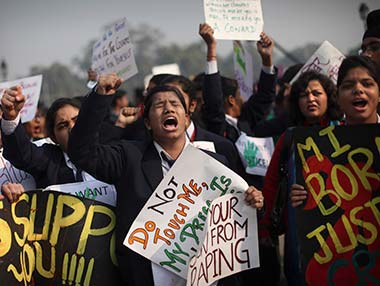By Arun George and Kavitha Iyer Not long from now, a fast-track court in Delhi will decide whether the four men held guilty of raping and murdering a 23-year-old physiotherapy student in a moving bus on the night of December 16 last year should be given the maximum sentence – the death penalty. While large numbers of people have been demanding capital punishment for the perpetrators of one of the most shocking and heinous crimes in recent years, there is also an argument against the death penalty. Here’s how each argument weighs in. Arun George — In favour: Should the Delhi four accused get the death penalty? Yes. Now that a court has established their guilt, it shows that the accused are guilty of one of the most heinous crimes reported in recent times. A specific law has been enacted following the incident in order to deter criminals from committing such acts in the future and there may be no case that is more fit to use it in. The accused not only gangraped the girl, they also attempted to run over the victim and her friend and destroy evidence of their crime in the most brutal way possible. The case does fall within the rarest of rare categories and the prosecution would be right in seeking the death penalty in the case. [caption id=“attachment_1100355” align=“alignleft” width=“380”] Protests after the Delhi gangrape. File photo. AP[/caption] Kavitha Iyer — Against: Even without going into the merits of the eye-for-an-eye-makes-the-whole-world-blind truism, some questions arise. What, or who, defines ‘rarest of the rare’? This can only be, at best, an arbitrary call. And at worst, it is a wildly dangerous one, given that we’re giving to the state the power to take lives. The other argument, as simple as it is absolutely true, is that capital punishment has never been the deterrent it is loosely made out to be. Countries that hand out the death penalty without much ado continue to do so — implying that crimes meriting that punishment according to their laws continue to occur. Arun George — In favour: The ’eye-for-an-eye’ argument about the death penalty is a larger issue that needs to be debated. However, as the Delhi gangrape case stands, the death penalty is still a valid one and still merits application. The application of the death penalty in this case won’t bring down rape in the country, but that again is something that needs to be dealt with separately and doesn’t all lie within the ambit of the law. In this case, the death penalty would send a message that as a society we are willing to take the strongest action possible against rapists. Kavitha Iyer — Against: Capital punishment sends out only one message – that we are a hypocritical society. We believe in the victim girl’s right to live and we will fly that flag by taking a life. The right to life is a supreme one, and retributive justice systems cannot overtake that right. So long as there is life, there is a chance to learn something, feel remorse, despair at one’s actions, come to terms with the fact that some crimes can have no forgiveness. The death penalty teaches nothing, only brutalises and dehumanises society. Arun George — In favour: I would counter that by saying that in some cases a convict gives up his chance to escape with mere regret for his crimes. None of the four accused in this case regretting their crime changes anything. There is no guarantee that the prison system will reform them and make them better in any way. In India, as the death penalty is used only in exceptional cases, it still sends out a message that there are some crimes that face the ultimate punishment. Courts have been given the power to pick cases in which the penalty should be applied. This in turn is done by the state, which is finally run by the people. If the people didn’t wish for the death penalty, it wouldn’t still be there. As a society we still believe that even if it does serve only as an example, it does act as a deterrent in some way. **Kavitha Iyer — Against:**The term ’exceptional cases’ implies that these cases are exceptions to a rule. But can there be exceptions to the foundations of progressive societies? If a penalty does not deter people from committing that crime, if there is no reformation through punishment, nor is there any scientific principle to pick out what qualifies as an exceptional case, then there is neither any guarantee of justice nor consistency in its application.
In the debate on right to life versus the state’s power to define what qualifies as ‘rarest of the rare’, there are two powerful arguments to weigh in.
Advertisement
End of Article
Written by FP Archives
see more


)

)
)
)
)
)
)
)
)



